The reasons for pursuing hotel contracts are numerous — and so are the benefits.
Where does the bedding industry turn when retail sales aren’t racking up the numbers they need to see? Today, a growing number of bedding manufacturers are looking to the hospitality sector as the key to opening up lucrative new revenue streams.
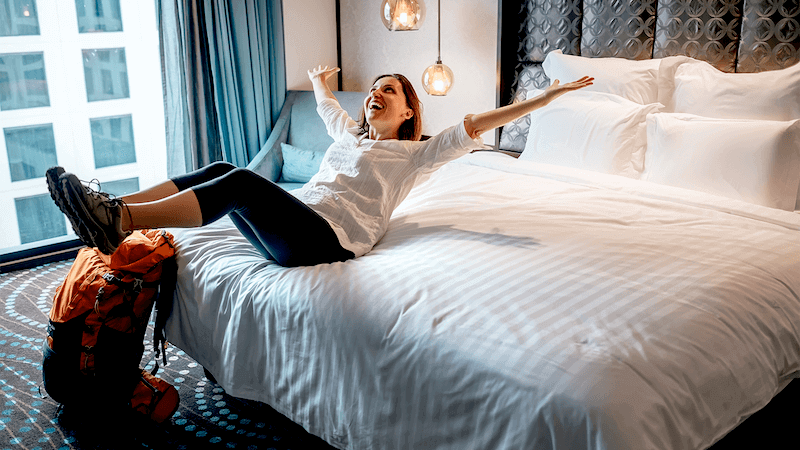
Why Hotels Are Investing in New Mattresses
Hospitality is a hot topic these days for a number of reasons. For one, the time is ripe for hotels to invest in new mattresses. The Covid-19 pandemic severely limited travel, and hotels did not invest heavily in maintenance or upgrades, according to Jared Carlitz, CEO of Bedding Industries of America. Then the world experienced a travel boom.
“As occupancy rates rose and stayed high, rooms and bedding took a beating and needed widespread replacement,” Carlitz says. “So, while the hospitality sector’s influence on the category is not necessarily a new trend or phenomenon, it is gaining a lot of attention from manufacturers today because of supply and demand.”
For many bedding manufacturers, courting the hospitality industry is a simple numbers game. As Vince Nicholson, director of hospitality and contract at Mebane, North Carolina-based Kingsdown, says, “Obviously, (hospitality) is important to us because it’s a category that continues to grow and is a category that is growing for us worldwide.”
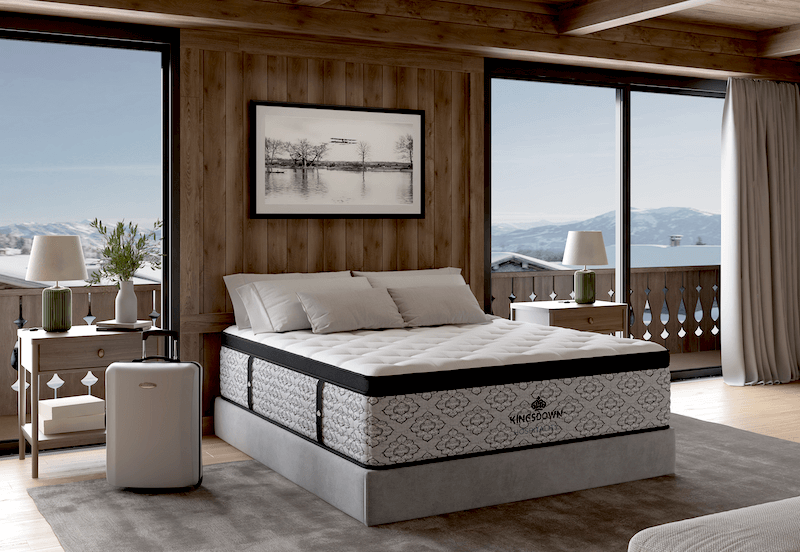
Luxury Hospitality collection.
Growing numbers is critical in the industry. The International Sleep Products Association’s 2023 Mattress Industry Trends Report showed an 8% drop in mattress shipments and a 2% decrease in wholesale dollar value. Its 2024 forecast predicts another 2% drop in wholesale value and a 4% decline in unit shipments.
“As the number of retail customers diminishes, we have to look at alternate channels of distribution and contract would be one of them,” says Gerry Borreggine, president and CEO of Princeton, New Jersey-based Therapedic International.
Carlitz agrees. “At a time when consumer demand is clearly down, more manufacturers and wholesalers are seeking out alternative revenue streams, and hospitality deals are attractive because they often offer steady recurring revenue.”
But that’s not the motivating factor for all producers. Nick Bates, CEO of Woburn, Massachusetts-based Spring Air International, says: “If business was booming, we’d still have a major focus on hospitality.”
The hospitality industry has been a focus for Norfolk, Virginia-based Paramount Sleep Co. “Hospitality has been a big part of the DNA of our company for 60 to 70 years,” says Richard Fleck, Paramount Sleep president.
Piana Sleep’s interest was driven by the hospitality sector’s growing focus on sustainability (see page 30). “Sustainability is at the core of our mission, and that’s what attracted us,” says Silvia Galasso, executive vice president of the Cartersville, Georgia-based bedding division of Piana Technology.
Boutique Hotels: A Growing Market for Bedding Manufacturers
Traditionally dominated by the major players, many bedding companies are now making significant inroads with boutique hoteliers.
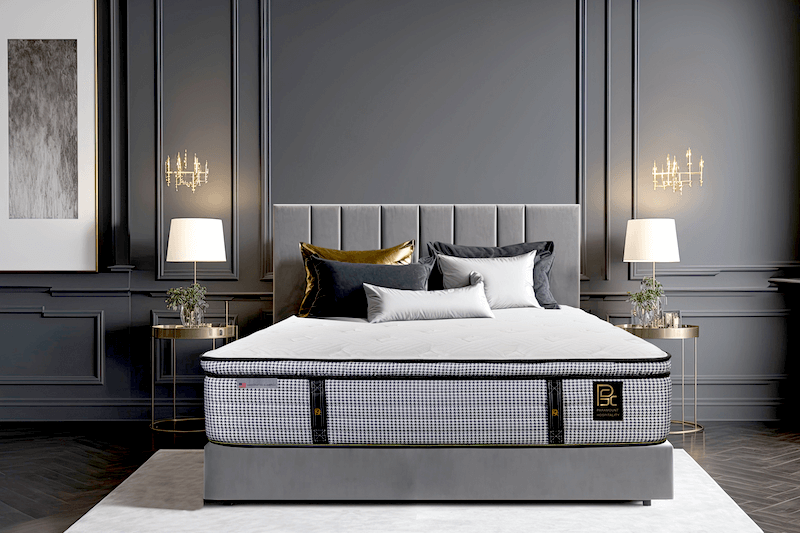
“Boutique hotels are very attractive for us,” says Laurie Tokarz, president and CEO of the Oak Lawn, Illinois-based Restonic Mattress Corp. “They have more interaction with their guests, focus more on individual comfort and rejuvenation, and understand the power of sleep.”
Paramount, Spring Air and Piana Sleep all seek out specialized upper-end hospitality chains that share similar goals and vision. “We need to find hospitality partners that are aligned with our values and are willing to feature a product that is going to provide guests with a superior experience,” Galasso says.
Kingsdown has served independent and boutique properties for more than 20 years.
Delivering Exceptional Customer Service in the Hospitality Industry
Today’s hoteliers seek responsive partners to relieve frustrations associated with supply chain issues and slow customer service.
Paramount is committed to a better experience for their hospitality customers. “We focus on better delivery, better quality, better warranties, better performance, better guest sleep experience and a more customized approach, meeting the guest needs of the property,” Fleck says.

Spring Air, BIA and Kingsdown focus on one of hospitality’s greatest pain points — lack of responsiveness and long lead times. “We ship faster than anyone in the hospitality segment,” Bates says. “When you call our customer service line or email us, you get a live person who can actually answer your questions. This is our personal human touch that our clients find so valuable.”
Similarly, Carlitz notes: “We are a national company, so with our facilities across the country, we have the capacity and logistical expertise to produce large and small quantities of product quickly and deliver it efficiently. And as large as we are, we are a family-run, family-operated business and the hotel chains always have direct access to our ownership team as top-priority customers. That personal touch makes a big difference.”
Nicholson says Kingsdown’s faster turnaround times and commitment to customer service set them apart. “We looked at the competitors’ products and tried to build something more durable to hold up in a hotel environment,” he says. “We’re ready to ship with one- to two-week turns to customers.”
Restonic offers its hospitality clients consistent standards and sleep experiences. “That’s what we’ve found is vitally important to many of the major chains,” Tokarz says. “We need to continue to show that we have a consistent specification globally.”
Enhancing Guest Comfort with Innovative Bedding Solutions
While many mattress makers strive to satisfy the hospitality market’s demands for consistent products and performance, others explore more innovative ways to customize the sleep experience.
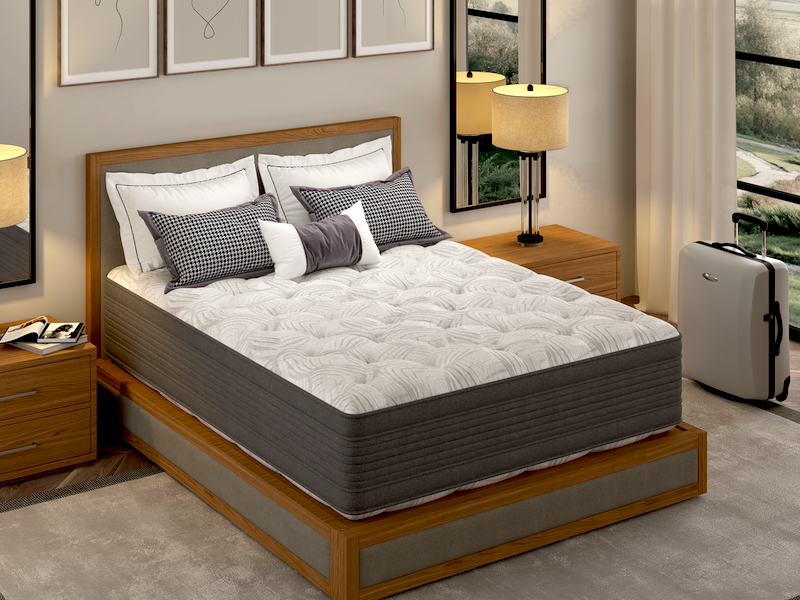
Kingsdown uses data profiles from its BedMatch system, an in-store diagnostic tool used by retailers, to design its hospitality collections. “We used the more than 20 million profiles we had to design the line,” says Gary Towning, Kingsdown vice president of marketing. “It’s the perfect guest room bed.”
Restonic, Spring Air and Piana all add features, such as antimicrobial and antiviral protection, moisture wicking and water-resistant fabrics, and sleep performance and recovery-enhancing materials to their hospitality collections.
“Our ability to add functionality to our mattresses through technologies like molecular printing or fiber treatments allows us to personalize our offerings for different properties and different brands,” Galasso says.
Overcoming the Challenges of Entering the Hospitality Market
Despite their diverse approaches, almost every manufacturer BedTimes spoke with agreed on one thing: how difficult it is to break into the hospitality industry.
“(Breaking into hospitality) is almost impossible,” Bates says. “Once you get in, it’s a matter of distinguishing yourself through your service and your product and making sure you get more referrals to keep that ball rolling.”
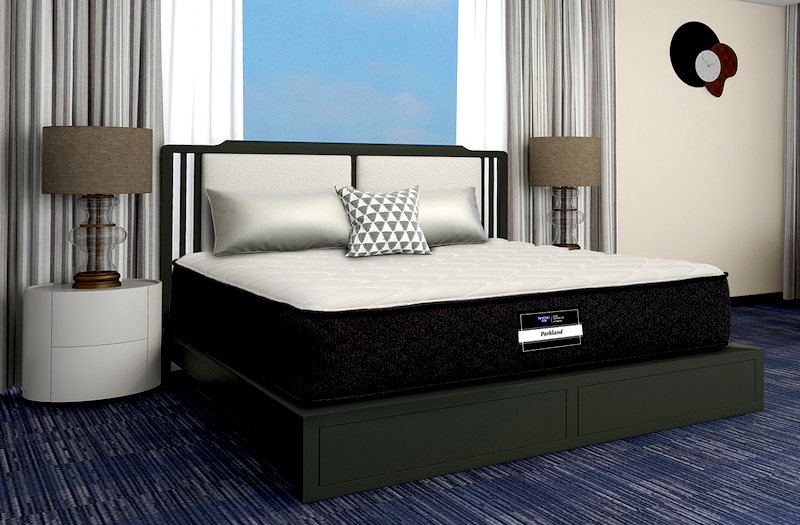
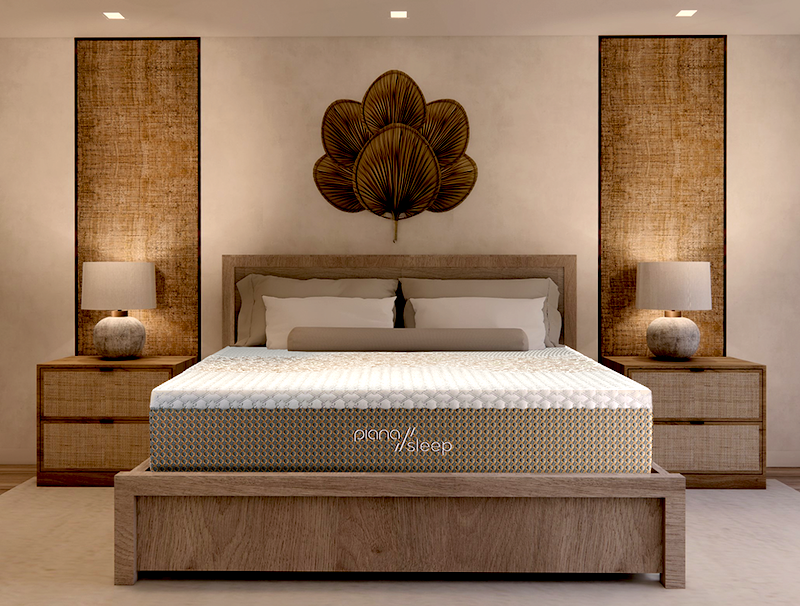
Fleck confirms that producers face many closed doors. “Companies like Marriott, IHG, Hyatt, Hilton or any of those mega groups are under a lot of (exclusive or long-term) vendor agreements.”
Borreggine and Tokarz also acknowledge that acquiring spots on large hotel chains’ approved supplier lists is a tall order. “We’re not on the Marriott or Hilton preferred list,” Borreggine says. “So, we have to really jump through hoops to get the order.”
For Nicholson, building relationships is the key. “Getting the right reps with regional contacts with the players and the buyers is important,” he says. “It’s a long game, not a short game.”
Galasso believes the greatest challenge is getting hospitality groups to acknowledge the importance of recycling programs: “To me, it’s about the urgency to change the way things are done.”
The Future of the Hospitality Bedding Market
Most manufacturers BedTimes talked with expect a blurring of the lines between the hospitality and retail sleep experiences.
“(Hospitality bedding) was a big commodity 30-plus years ago,” Fleck says. “Today, it’s about delivering that consumer promise of a better guest experience.”
Tokarz foresees working more closely with smaller hotel chains to create unique bed offerings that “bring some value that separates them in the marketplace,” she says. “Our goal is to help our hotel partners offer something their competition doesn’t.”
Piana Sleep predicts a growing focus on “sustainability, health and wellness, and hygiene,” Galasso says. “Some of the new and emerging hospitality brands we’ve been working with are focused on things like health and wellness or athletic recovery.”
Borreggine believes adjustable bed bases are the next big thing. “That’s an amenity a lot of Americans enjoy at home, and they would like to have that while traveling,” he says.
Nicholson, Tokarz, Fleck and Carlitz also see guest purchase programs becoming more prevalent, bringing the hospitality and the retail sleep experiences closer together. Guest feedback and data like that gathered by Kingsdown’s BedMatch system help manufacturers develop bedding that caters more closely to consumers’ demands based on real-world experiences. Then, initiatives like guest purchase programs also help hotel properties and bedding manufacturers form a closer personal relationship with consumers that exists independently of the retail sales channel.
“When you think about it, the consumer buying in a retail store actually never sleeps on your bed,” Fleck says of guest purchase programs. “A hospitality property is a true rest-test that you can’t get in any other type of retail condition.”




